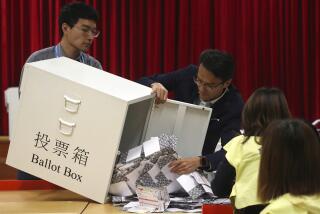Hong Kong’s Cushy Jobs Face Cutbacks
- Share via
HONG KONG — If President Clinton makes $200,000 a year, how much should a territory with fewer residents than New York City pay its leader?
In affluent Hong Kong, the answer is twice as much: the equivalent of $416,616 a year for Chief Executive Tung Chee-hwa.
Besides the golden Rolls-Royces rolling along bustling streets lined with jewelry shops, this small Chinese territory--population 6.8 million, compared with New York’s 7.3 million--is famous for the sumptuous pay of its civil servants.
But with a deep recession biting into the public coffers, pressure is on for the government to cut its payroll, where employees not only get a good wage, pension and benefits but also lifetime job security in an arrangement dubbed “the iron rice bowl.”
Financial Secretary Donald Tsang has announced a hiring freeze and a salary freeze for Hong Kong’s 180,000 civil servants. The chilliest part of all is his proposal to kill the jobs-for-life system, which values seniority more than performance.
The change, if approved, could shake the civil service to the core. Some analysts warn it may lead to more corruption and a less stable government.
Under the proposal, new civil servants would be hired on contracts--without pensions--instead of getting guaranteed lifetime appointments. Veterans would have to compete with new arrivals from the private sector for promotions and pay increases.
Salaries for most lower-ranked officials would also come down to match those offered in the private sector, said Duncan Pescod, deputy secretary for the civil service, who is in charge of the reform effort.
The pay cuts could extend all the way down to the level of government maids, who earn nearly $1,300 a month, about twice what most maids in Hong Kong are paid.
Senior officials like Tsang probably would not be hit with any cuts--or might even get pay increases--as they continue to draw pay in line with salaries at blue-chip multinational corporations, Pescod said.
Tsang, the third most powerful official in Hong Kong, makes about $26,250 a month. By contrast, Britain, Hong Kong’s former colonial master, pays its chancellor of the exchequer, Gordon Brown, $6,000.
Stephen Lam, spokesman for Hong Kong’s chief executive, is paid $23,200 a month. His far more visible American counterpart, White House Press Secretary Joe Lockhart, gets just over $10,000.
Taxpayers are generally happy about the proposal to scale back the iron rice bowl, but academics who study the civil service are sounding a cautionary note.
Political analysts credit the high pay and lifetime jobs for helping Hong Kong build a stable, professional government relatively free of corruption and cronyism.
Michael DeGolyer, a political scientist at Baptist University, said taking away the goodies might encourage corruption and turn the best and brightest away from public life, especially during economic booms that offer private-sector workers greater rewards.
“After the third bad review, the only way to curry favor is, well, frankly, to curry favor,” he said.
An engineer at the Drainage Services Department, who spoke on condition he not be identified to avoid offending superiors, predicted the changes would only breed resentment.
Although the new contract system initially would apply only to new hires, veteran civil servants worry that they, too, might be forced to give up incomes with pensions and go on contracts when they get promotions, he said.
The engineer also said he and most of his colleagues had forgone more glamorous corporate jobs for stable but often boring government service.
“If a civil service job can’t offer the stability, why don’t we go for the private sector instead?” he asked.
More to Read
Sign up for Essential California
The most important California stories and recommendations in your inbox every morning.
You may occasionally receive promotional content from the Los Angeles Times.













